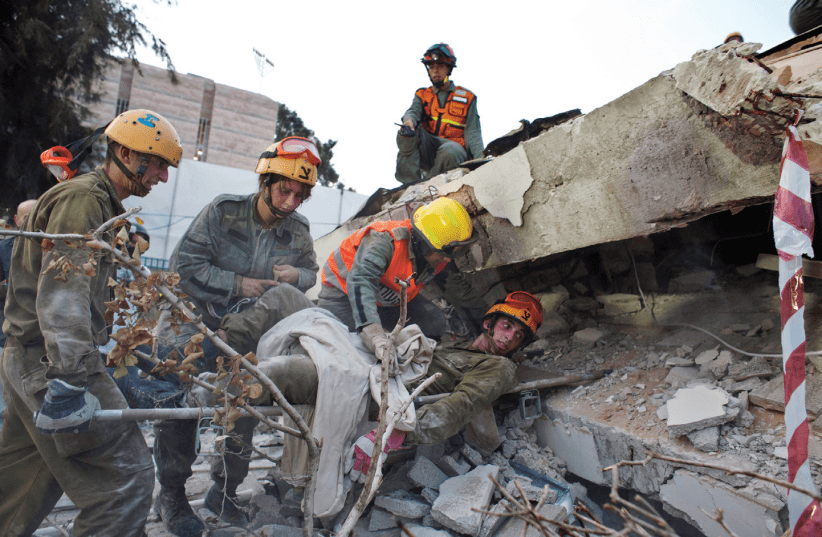In the shadow of conflict with Gaza, the State Comptroller’s Report said on Wednesday that Israel’s rescue plans are deficient, due to the failure to update them since 1992, leaving the home front dangerously vulnerable to attack.
According to Joseph Shapira’s report, the failure of the Home Front Command and associated authorities to update their rescue plans and teams’ needs during an evaluation in 2016 means that they have no idea whether the assigned responders they have for different parts of the country are sufficient.
Covering February 2017 to April 2018, the report said that current plans have assigned rescue teams to carry out both evacuations of potentially endangered parts of the home front as well as targeted rescues of individual people already in immediate danger.
Shapira wrote that a lack of clarity about these missions could leave major gaps in certain areas, while also wasting resources by doubling up in other areas.
One specific issue addressed by the report was that rescue teams are not trained for performing rescues from larger and more modern buildings.
Moreover, the report said that rescuers have no clear tactics for quickly and efficiently getting people out of situations where they are trapped on high floors, especially if this occurs in multiple locations simultaneously.
The gap in training is even worse with rescuers from the reserve units, who train only in traditional settings that they are familiar with and are likely to be thrown off by the unexpected challenges they will confront in the midst of a crisis, Shapira said.
In addition, rescue teams have only an estimated 8% of the ambulances they are likely to need in a crisis.
The report added that reserve rescue teams do not have sufficient mechanical and engineering gear required for carrying out rescue missions in structures that have been damaged.
The IDF responded that some of the issues were already being dealt with, while disagreeing with the comptroller on other issues.
For example, regarding the shortage in ambulances, the IDF said that it would be receiving 160 additional ambulances on a rolling basis by the end of 2020.
Furthermore, the IDF said that it is already improving some of its training for the rescue teams to better cope with new crisis situations and structures.
In contrast, the IDF disputed the comptroller’s argument that having rescue teams designated for both pre-crisis evacuation and mid-crisis rescue would lead to confusion and inefficiency.
Rather, the IDF said that many of its units are required to multi-task to cover all of the army’s needs and do so at a high level.
Finally, the IDF emphasized that as important as rescue teams are, there might always be some deficiency because the IDF’s budget limitations force it to make choices, and some other operations it must perform are higher priority.
IN A separate section of the report, the comptroller said that the police are misusing their NIS 2.9 billion slated for purchasing assets by violating conflict of interest principles as well as their obligations to have open bidding processes to sell to the police.
The largest problem came from the police artificially acting to split up financial requests into subparts in order to fall under budget cutoffs which would have required an open bidding process, said Shapira.
The comptroller essentially said that these subparts were all part of one project, and that the police were using financial tricks to try to avoid the transparency and fair competition that open bidding imposes.
Shapira’s clear implication was that police officials wanted to grant deals for police purchases to close associates in a way that violated conflict of interest principles, something that open bidding would block.
In this way, the police avoided probing conflicts of interest, and did not even make an official conflict of interest policy.
Seventy-six out of 118 orders in the cultural arena between January 2016 and May 2018 were made improperly.
The most publicized example relates to prime ministerial candidate Benny Gantz’s former company, The Fifth Dimension.
In another example, the police rabbinical unit spent NIS 340,000 on 17 orders for mezuzot from a supplier whom they selected without a competitive bidding process.
Another issue was Public Security Minister Gilad Erdan diverting hundreds of millions of shekels, from already police-approved projects that were under way to new projects regarding which he had not consulted with police, said the report.
Furthermore, the report said that Erdan had not fully explored the viability of his new pet projects and the possible damage to other police activities from diverting the funds.
Erdan redirected the criticism against the police, saying that when he acted against arrangements that the police had made, it was to hold back the very tendencies of the police criticized by the state comptroller.
He said that without his intervention, the police would have had a free hand to spend state funds in problematic ways, and that it was his job to act as a check against misuse of funds.
